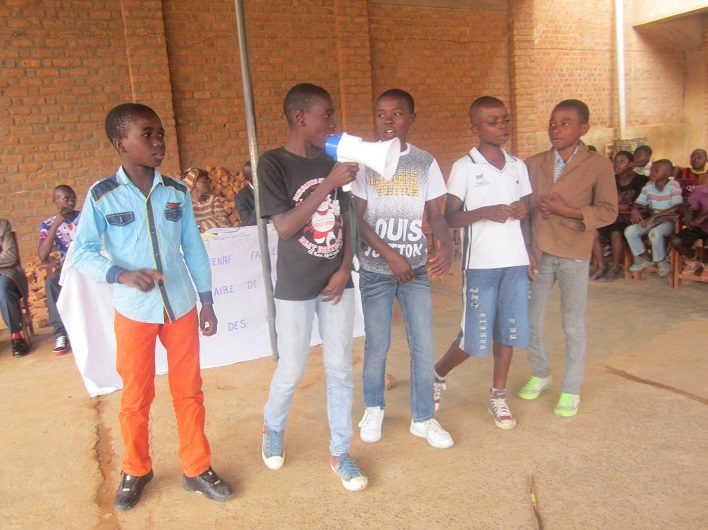All Children Are Talented

In Bukavu, Democratic Republic of the Congo, to mark Universal Children’s Day on 20 November 2015, children, young people, and adults gathered at an elementary school for children with disabilities.
The celebration, hosted in the Heri Kwetu (“happy with us”) elementary school, was organized by a non-profit coalition called Solidarity Space for Children, in link with the city department for gender, women, and children. They chose this school — the only one in the city that teaches children who are visually impaired, blind, deaf, hearing impaired, or otherwise physically disabled — to build a sense of community with children who rarely have visitors. Among the participants in the event were a number of children from neighbouring schools, as well as Tapori children, members of the Children’s Committee of Kadutu, and some adults.
When the event began, some of the visiting children were surprised when a visually impaired girl stood to welcome them. Justin, a facilitator who accompanied the children, heard an 8-year-old boy asking, “How can she do that without looking at her paper? Did she learn the whole speech by heart?” In fact, the girl was reading her speech in braille. It was a discovery for the 8-year-old that someone who cannot see could read as well as he could.
After the welcome, various presentations illustrated the event’s main theme: ending early marriage. All the children participated: students without disabilities from neighbouring schools performed a skit, recited poems, danced, and sang a song; two hard-of-hearing girls took part in a fashion parade; a physically disabled student gave a speech; and a young Tapori member described what children do in Tapori groups and compared their activities with those of this celebration.
After the presentations, a Tapori girl told Justin that she had enjoyed all of the day’s activities. She said they had brought a smile to everyone’s face and had allowed all the children, whatever their situation, to display their talent, share their thoughts, and work together to achieve something meaningful.
Among the adults present were Mr. Kizito from the child protection section of the United Nations’ Stabilisation Mission in the Democratic Republic of the Congo; a representative from the district council of Kadutu; a representative of the mayor of Bukavu; the director of the city department for gender, women, and children; and the principal and some teachers of the Heri Kwetu school.
At the end of the day, some of the adults made speeches to thank the children for having participated in activities that promote the well-being of all children. They stressed the importance of giving priority to education and preparation for the future.
The participants in this celebration came from different backgrounds, and yet they all showed that supporting, respecting, and listening to children — whatever their background or living conditions — gives them confidence and allows them to thrive. They also made the point that people must look out for and combat any abuses that could prevent children from achieving their full potential. Those were the messages they delivered throughout the day’s celebration in Bukavu.

